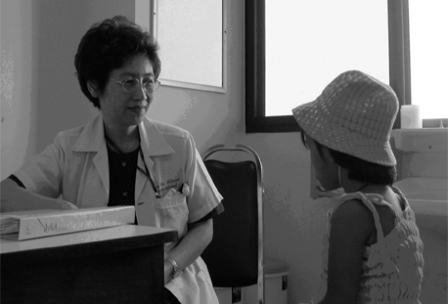TREAT Asia Pediatric Site Profile: The Research Institute for Health Sciences, Chiang Mai, Thailand, and YRG Care, Chennai, India
September 2007—The specter of a single child suffering with HIV/AIDS can be unbearable, yet across Asia 180,000 children are living with the virus and most will face death if they are not treated. Pediatricians and researchers in the region are fighting back, and at two highly regarded clinics in Thailand and India, pediatric HIV/AIDS specialists are helping hundreds of children with care and medication, and conducting clinical research that may save the lives of thousands more.
The two clinics—the Research Institute for Health Sciences at Chiang Mai University in Chiang Mai, Thailand, and the Y. R. Gaitonde Centre for AIDS Research and Education (YRG CARE) in Chennai, India—have long experience caring for HIV-positive children. Currently around 380 children are under care at YRG CARE, close to 100 of whom are receiving antiretroviral (ARV) treatment, and more than 220 are at Chiang Mai, all on ARVs. Driving forces behind the TREAT Asia Pediatric Network, the two sites are the first to submit data for the newly formed TREAT Asia Pediatric HIV Observational Database (TApHOD).
Although YRG CARE and the Research Institute share a commitment and a long history of fighting HIV/AIDS among children, the path of the epidemic in their home countries presents different challenges, perhaps most notably in the availability of treatment to prevent mother-to-child HIV transmission—the overwhelming source of infection among infants and children in resource-limited countries. In Thailand, where HIV was fought early and aggressively, the government estimates that drugs to prevent perinatal HIV transmission are available to more than 90 percent of pregnant women who need them; in India, UNAIDS indicates that the figure is around 2.7 percent.

Dr. Virat Sirisanthana with a young patient. |
Confronted with devastating numbers of maternal and pediatric infections, YRG CARE became one of the first clinics in India to initiate a dedicated HIV/AIDS program for women and children. According to Dr. N. Kumarasamy, YRG CARE’s chief medical officer and principal site investigator for TREAT Asia studies, the program began in 1996 with eight beds and has expanded to provide prevention of mother-to-child transmission (PMTCT), counseling, and in- and out-patient treatment for children with HIV.
Although Tamil Nadu, where the clinic is located, is among the Indian states with the highest HIV prevalence, YRG CARE has established model pediatric and PMTCT programs and provides continuing HIV education for pediatricians. Region-wide, progress in preventing pediatric transmission is moving forward. Highlighting lower prevalence at antenatal clinics, UNAIDS reported last year that “The HIV burden in Tamil Nadu, where effective interventions have been in place for several years, has begun to fall.”
Chiang Mai’s Research Institute is also situated in a region where HIV is rampant (in both Chennai and Chiang Mai, injecting drug users are primarily affected). But in 2001, the Thai government began to provide ARVs nationwide to expectant HIV-positive mothers, and the result has been a significant drop in pediatric HIV/AIDS.
Dr. Virat Sirisanthana of Chiang Mai’s Research Institute has seen the ebb and flow of death and hope in the lives of her young patients. Head of pediatric infectious diseases at Chiang Mai University, a clinical research leader at the Research Institute, and a member of the TREAT Asia Steering Committee, she oversees a pediatric HIV/AIDS program that conducts clinical research and provides PMTCT services as well as treatment and care for HIV-infected children.
Although the Thai government supports the distribution of both first- and second-line ARVs for pediatric patients, little is known about the proper treatment of children with HIV, and doctors at the Research Institute work to find optimal medications. The most urgent questions confronted at the Research Institute, according to Dr. Sirisanthana, involve when to initiate treatment, which drugs to use and at which dosages, and when to switch regimens to avoid side effects or treatment failure. In order to help answer some of those questions, clinical researchers at the Institute have focused their inquiries on patterns of disease presentation, PMTCT, efficacy of highly active antiretroviral therapy in children, short- and long-term outcomes, and psychosocial issues facing children.
In Chennai, YRG CARE also conducts research aimed at expanding understanding of pediatric HIV/AIDS, studying the natural history of HIV in adults and children, and running ARV randomized clinical trials. With few pediatric HIV preparations available in Asia, doctors at YRG CARE, as well as the Research Institute, are forced to treat children by splitting adult medication—an imprecise process that suggests why health-care personnel around the world are calling for greater availability of affordable pediatric ARVs. To move that agenda forward and provide answers to the many unknowns about pediatric treatment, both institutions are committed to a program of extensive clinical research on pediatric HIV/AIDS.
Through treatment and research efforts in India and Thailand, and participation in the Asia-wide research being initiated by TApHOD, YRG CARE and the Research Institute are actively involved in understanding the impact of pediatric HIV in the region—a crucial first step towards providing HIV-positive children in Asia with life-saving treatment and care.